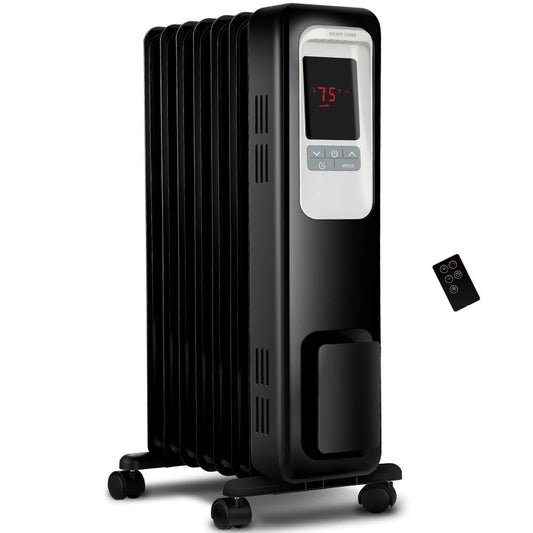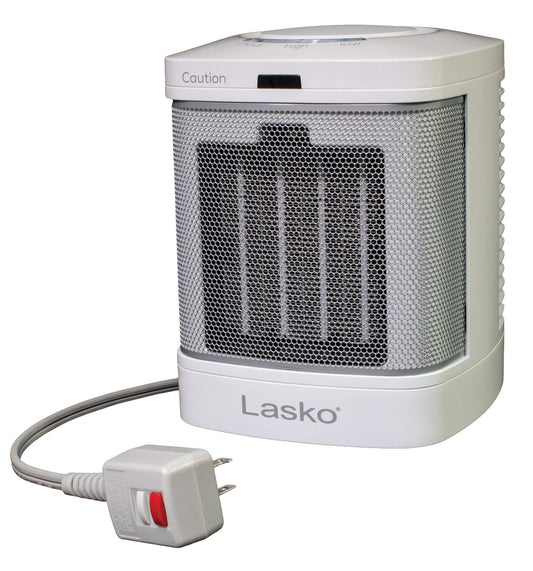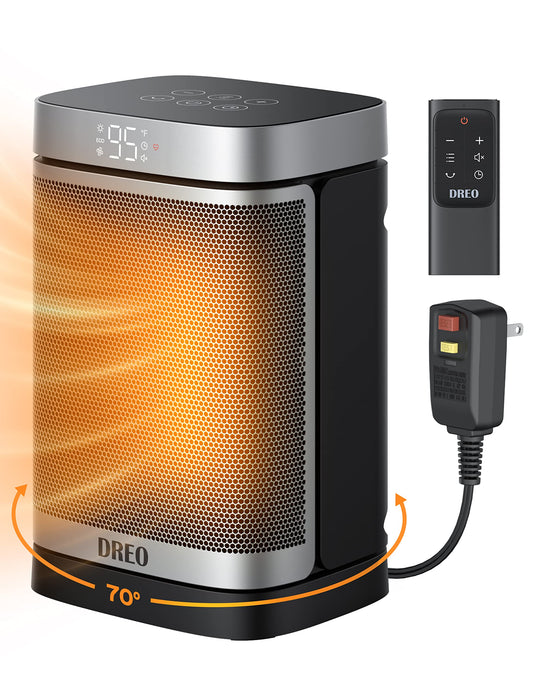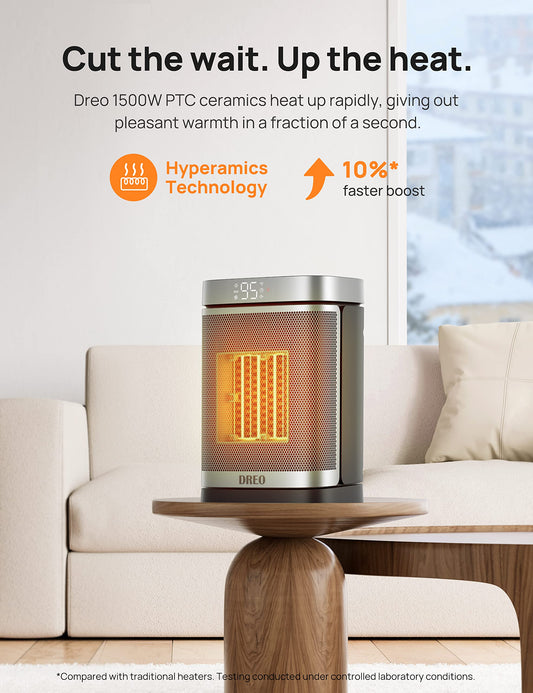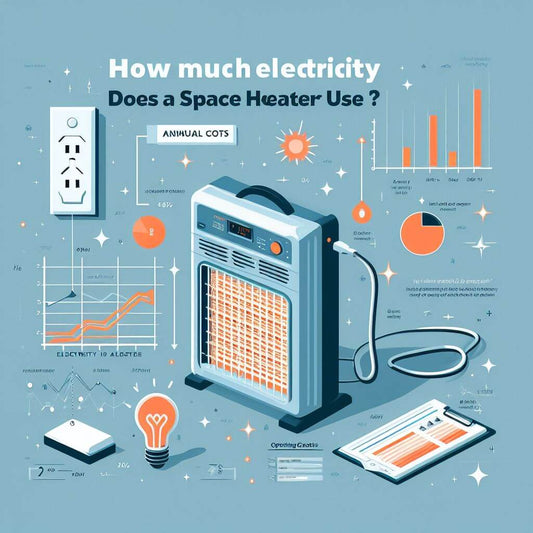How Space Heaters Work. Do Space Heaters Save Money?
Summary
No, space heaters do not save money in most cases. They are less efficient than central heating systems and can increase your electricity bill significantly.

Some links affiliate links that we may earn a commission.
Introduction
Space heaters are devices that heat up a small area or room. They are usually portable and can be plugged into an electrical outlet. Many people use space heaters to supplement their central heating system, or to avoid using it altogether. But do space heaters really save money on heating bills? Or are they just a waste of energy and a fire hazard? In this article, we will answer these questions and more. We will explain how space heaters work, what types of space heaters are available, how to choose the best space heater for your needs, how to use it safely and efficiently, how to calculate the cost of running a space heater, how to compare it with the cost of central heating, and how to save money on heating bills with a space heater. We will also recommend some of the best space heaters for different purposes and budgets. By the end of this article, you will have a better understanding of whether space heaters are worth it or not.
How Space Heaters Work
Space heaters work by converting electricity, fuel, or oil into heat. They then distribute the heat to the surrounding air or objects by one of these methods:
- Radiation: This is when heat is emitted directly from a hot surface, such as a metal coil, a ceramic plate, or a quartz tube. The heat travels in straight lines and only warms up the objects or people that are in its path. This is similar to how the sun heats up the earth. Radiant heaters are ideal for spot heating, as they can provide instant and focused warmth. However, they can also pose a fire hazard if they come in contact with flammable materials, and they can cause burns if touched.
- Convection: This is when heat is transferred by the movement of air. The heater draws in cold air from the bottom, heats it up with an element, and then blows it out from the top or the front. The warm air circulates throughout the room and gradually raises the temperature. Convection heaters are suitable for heating up a whole room, as they can create a uniform and comfortable heat. However, they can also take longer to warm up the room, and they can be noisy due to the fan.
- Micathermic: This is a combination of radiation and convection. The heater uses a thin sheet of metal coated with a mineral called mica, which can generate heat quickly and evenly. The heater emits both radiant and convection heat, which can warm up the room faster and more efficiently. Micathermic heaters are also quieter and lighter than other types of heaters. However, they can also be more expensive and less durable than other types of heaters.
Types of Space Heaters
There are many types of space heaters available in the market, each with its own advantages and disadvantages. Some of the most common types are:
- Electric space heaters: These are the most popular and widely used type of space heaters. They run on electricity and can be plugged into any standard outlet. They come in various shapes, sizes, designs, and features. They can be classified into four main categories based on their heating method: radiant, convection, micathermic, and fan heaters. Electric space heaters are easy to use, portable, and versatile. However, they can also be expensive to operate, especially if the electricity rate is high. They can also pose a fire risk if not used properly, and they can dry out the air and cause static electricity.
- Fuel space heaters: These are space heaters that use combustible fuels such as propane, natural gas, kerosene, or wood to generate heat. They can be either vented or unvented. Vented heaters have a pipe or a chimney that expels the combustion gases outside the room, while unvented heaters release the gases into the room. Fuel space heaters can be very powerful and efficient, and they can work even when there is a power outage. However, they can also be dangerous, as they can produce carbon monoxide, a deadly gas that is odorless and colorless. They can also cause fire hazards, and they require regular maintenance and refilling of the fuel.
- Oil space heaters: These are space heaters that use oil as a heat reservoir. The oil is heated by an electric element, and then circulated through metal fins or tubes. The heat is then radiated to the surrounding air. Oil space heaters are similar to electric radiant heaters, but they are more stable and retain heat longer. They are also quieter and safer than other types of heaters. However, they can also be heavier, slower, and more expensive than other types of heaters.
Factors to Consider When Choosing a Space Heater
When choosing a space heater, there are several factors to consider, such as:
- Size of the room: The size of the room determines how much heat output you need from the heater. A general rule of thumb is to multiply the square footage of the room by 10 to get the wattage of the heater. For example, if the room is 150 square feet, you need a heater that is 1500 watts. However, this is only an estimate, and you may need more or less heat depending on the insulation, ceiling height, windows, and other factors of the room.
- Type of heater: The type of heater affects the heating performance, energy efficiency, safety, and noise level of the heater. As we discussed earlier, there are different types of heaters based on their heating method and fuel source. You should choose the type of heater that suits your needs, preferences, and budget. For example, if you want a heater that can warm up a whole room quickly and evenly, you may opt for a convection heater. If you want a heater that can provide instant and focused warmth, you may prefer a radiant heater. If you want a heater that can save energy and money, you may consider a fuel heater. If you want a heater that is quiet and safe, you may go for an oil heater.
-
Features and functions: The features and functions of the heater affect the convenience, comfort, and control of the heater. Some of the common features and functions that you may look for are:
- Thermostat: This is a device that regulates the temperature of the heater. It can either be manual or digital. A manual thermostat has a dial or a knob that you can adjust to set the desired temperature. A digital thermostat has a display and buttons that you can use to set the exact temperature. A thermostat can help you save energy and money by turning off the heater when the room reaches the set temperature, and turning it on again when the room cools down.
- Timer: This is a feature that allows you to set the heater to turn on or off at a specific time. For example, you can set the heater to turn on before you wake up in the morning, and turn off when you leave for work. A timer can help you save energy and money by avoiding unnecessary heating, and also provide you with comfort and convenience by having a warm room when you need it.
- Remote control: This is a device that allows you to control the heater from a distance. For example, you can adjust the temperature, the timer, the fan speed, the oscillation, and other functions of the heater without getting up from your bed or couch. A remote control can provide you with comfort and convenience by making it easier to operate the heater.
- Eco mode: This is a function that reduces the energy consumption of the heater. For example, it may lower the wattage, the fan speed, or the temperature of the heater when the room is warm enough. Eco mode can help you save energy and money by using less electricity, and also reduce the environmental impact of the heater.
- Oscillation: This is a function that makes the heater rotate or swing from side to side. This can help distribute the heat more evenly and widely throughout the room, and also create a more pleasant and natural airflow. Oscillation can enhance the heating performance and comfort of the heater.
- Noise level: This is the amount of sound that the heater produces when it is running. Some heaters are louder than others, depending on their type, size, and fan speed. For example, fan heaters tend to be noisier than radiant heaters, and large heaters tend to be noisier than small heaters. The noise level of the heater can affect your comfort and sleep quality, especially if you are sensitive to sound. You should choose a heater that has a low noise level, or one that has a silent mode or a night mode that reduces the noise.
How to Use a Space Heater Safely and Efficiently
Space heaters can be a great way to keep warm and cozy during the cold winter months, but they can also pose some risks if not used properly. Here are some tips on how to use a space heater safely and efficiently:
- Read the manual: Before using a space heater, you should read the manual carefully and follow the instructions and warnings. You should also check the heater for any damages or defects, and contact the manufacturer or the seller if you find any.
- Place the heater on a flat, stable, and non-flammable surface: You should never place a space heater on a carpet, a rug, a bed, a couch, a table, or any other surface that can catch fire or tip over. You should also keep the heater at least three feet away from any combustible materials, such as curtains, furniture, bedding, clothing, paper, or plants.
- Plug the heater directly into a grounded outlet: You should never plug a space heater into an extension cord or a power strip, as they can overheat and cause a fire. You should also avoid using other appliances on the same circuit as the heater, as they can overload the circuit and cause a short circuit or a power outage.
- Do not leave the heater unattended or overnight: You should always turn off and unplug the heater when you leave the room or go to sleep. You should also keep children and pets away from the heater, and never let them play with it or touch it. You should also install smoke detectors and carbon monoxide detectors in your home, and test them regularly.
- Adjust the thermostat and the timer: You should set the thermostat to the lowest comfortable temperature, and use the timer to turn the heater on and off according to your schedule. This can help you save energy and money, and also prevent overheating or underheating the room.
- Clean and maintain the heater: You should clean the heater regularly to remove any dust or dirt that can clog the vents or the fan. You should also check the heater for any signs of wear and tear, and replace any parts that are broken or damaged. You should also store the heater in a cool and dry place when not in use, and protect it from moisture and insects.
How to Calculate the Cost of Running a Space Heater
One of the main concerns that people have about using a space heater is the cost of running it. Do space heaters save money? To calculate the cost of running a space heater, you need to know three things: the wattage of the heater, the electricity rate, and the hours of use. Here is the formula to calculate the cost:
Cost = (Wattage x Electricity Rate x Hours of Use) / 1000
For example, if you have a 1500-watt heater, the electricity rate is 12 cents per kWh, and you use the heater for 8 hours a day, the cost is:
Cost = (1500 x 0.12 x 8) / 1000 Cost = $1.44 per day
To calculate the cost per month, you can multiply the cost per day by the number of days in the month. For example, if the month has 30 days, the cost is:
Cost = $1.44 x 30 Cost = $43.2 per month
To calculate the cost per year, you can multiply the cost per month by the number of months in the year. For example, if the year has 12 months, the cost is:
Cost = $43.2 x 12 Cost = $518.4 per year
Of course, these are only estimates, and the actual cost may vary depending on the type of heater, the size of the room, the insulation, the temperature, and other factors. You can use an online calculator or a smart meter to get a more accurate estimate of the cost of running a space heater.
How to Compare the Cost of Space Heaters with Central Heating
Another question that people often ask is whether space heaters are cheaper than central heating. The answer is not so simple, as it depends on many factors, such as the type of central heating system, the fuel source, the efficiency, the size of the house, the climate, and the usage. However, here are some general guidelines to help you compare the cost of space heaters with central heating:
- Space heaters are cheaper than central heating if you only need to heat one or a few rooms: If you live in a small apartment or a house with a few rooms, and you only need to heat the rooms that you use, space heaters can be cheaper than central heating. This is because space heaters can provide targeted and zonal heating, while central heating can waste energy and money by heating the whole house, even the rooms that are not occupied. For example, if you only need to heat your bedroom and your living room, you can use two space heaters instead of turning on the central heating system.
- Space heaters are more expensive than central heating if you need to heat the whole house: If you live in a large house with many rooms, and you need to heat the whole house, space heaters can be more expensive than central heating. This is because space heaters can consume a lot of electricity, while central heating can use cheaper and more efficient fuel sources, such as natural gas, propane, or oil. For example, if you need to heat 10 rooms, you may need 10 space heaters, which can cost a lot of money to run, while central heating can heat the whole house with one system.
How to Save Money on Heating Bills with a Space Heater
Space heaters can help you save money on heating bills if you use them wisely and efficiently. Here are some tips on how to save money on heating bills with a space heater:
- Use a space heater as a supplement, not a substitute: You should use a space heater to supplement your central heating system, not to replace it. You can use a space heater to heat up the room that you are in, and lower the thermostat of the central heating system by a few degrees. This can help you save energy and money by reducing the workload of the central heating system, and also provide you with more comfort and control over the temperature of the room.
- Choose the right type and size of space heater: You should choose the type and size of space heater that matches your needs and preferences. You should consider the heating method, the fuel source, the energy efficiency, the safety, the noise level, and the features and functions of the space heater. You should also consider the size of the room that you want to heat, and choose a space heater that has enough heat output to warm it up. You should avoid using a space heater that is too small or too large for the room, as it can waste energy and money by underheating or overheating the room.
- Use the features and functions of the space heater: You should use the features and functions of the space heater to optimize its performance and efficiency. You should use the thermostat to set the desired temperature, and use the timer to turn the heater on and off according to your schedule. You should also use the eco mode, the oscillation, the fan speed, and other functions to adjust the heat output and the airflow of the heater. You should also use the remote control to control the heater from a distance, and avoid moving the heater frequently, as it can damage the heater or the outlet.
- Maintain and clean the space heater: You should maintain and clean the space heater regularly to ensure its safety and efficiency. You should check the heater for any damages or defects, and contact the manufacturer or the seller if you find any. You should also clean the heater to remove any dust or dirt that can clog the vents or the fan. You should also store the heater in a cool and dry place when not in use, and protect it from moisture and insects.
Best Space Heaters for Different Purposes and Budgets
There is no one-size-fits-all solution when it comes to choosing the best space heater for your home. Different types of heaters have different advantages and disadvantages, depending on your needs, preferences, and budget. Here are some of the best space heaters for different purposes and budgets, based on our research and reviews.
Best Space Heater for Large Rooms: Dr. Infrared Heater DR-998
If you need to heat a large room, such as a living room, a basement, or a garage, you might want to consider the Dr. Infrared Heater DR-998. This heater uses infrared technology to produce heat that is more penetrating and lasting than conventional heaters. It also has a dual heating system that combines a quartz tube and a PTC element, which can heat up to 1000 square feet of space. The heater also features a built-in humidifier and an oscillating fan, which can add moisture and circulate the warm air in the room. The heater has a digital thermostat that can be adjusted from 50 to 86 degrees Fahrenheit, and a 12-hour timer that can be set to turn the heater on or off automatically. The heater also comes with a remote control, a caster wheel, and a lifetime filter. The heater is safe to use, as it has a tip-over switch, an overheat protection, and a cool touch exterior. The heater is also energy efficient, as it uses only 1500 watts of power, and has an eco mode that can reduce the wattage to 1000 or 500 watts, depending on the room temperature. The heater is rated 4.4 out of 5 stars on Amazon, with over 3000 reviews. Some of the pros and cons of this heater are:
Pros:
- Heats large rooms effectively and evenly
- Adds humidity and improves air quality
- Has multiple settings and features for convenience and comfort
- Saves energy and money on heating bills
- Has a sleek and portable design
Cons:
- Can be noisy when the fan is on
- Can emit a plastic smell when first used
- Can be expensive compared to other heaters
You can buy the Dr. Infrared Heater DR-998 on Amazon ›
Best Space Heater for Small Rooms: Vornado VH5 Personal Vortex Space Heater
If you need to heat a small room, such as a bedroom, an office, or a nursery, you might want to consider the Vornado VH202 Personal Vortex Space Heater. This heater uses vortex technology to create a powerful airflow that can distribute heat evenly throughout the room. The heater has two heat settings (low and high), and a dial thermostat that can be adjusted to your desired temperature. The heater also has a fan-only option that can be used for cooling in the summer. The heater is safe to use, as it has a tip-over switch, an overheat protection, and a cool touch case. The heater is also energy efficient, as it uses only 750 watts of power, and has a vortex action that can heat the room faster and more efficiently than other heaters. The heater is rated 4.3 out of 5 stars on Amazon, with over 600 reviews. Some of the pros and cons of this heater are:
Pros:
- Heats small rooms quickly and evenly
- Has simple and easy-to-use controls
- Has a quiet and smooth operation
- Has a compact and lightweight design
- Has a 5-year warranty
Cons:
- Can be too hot to touch when on high setting
- Can be insufficient for very cold rooms
- Can be pricey for its size and performance
You can buy the Vornado VH5 Personal Vortex Space Heater on Amazon ›
Best Space Heater for Bathrooms: Lasko CD08200 Bathroom Heater
If you need to heat a bathroom, you might want to consider the Lasko CD08200 Bathroom Heater. This heater is specially designed for bathroom use, as it has a high heat output, a quick heat-up time, and a moisture-resistant construction. The heater has two heat settings (high and low), and a one-hour timer that can be set to turn the heater off automatically. The heater also has a simple push-button control, and an indicator light that shows when the heater is on. The heater is safe to use, as it has a tip-over switch, an overheat protection, and a cool touch exterior. The heater is also energy efficient, as it uses only 1500 watts of power, and has a ceramic heating element that can heat the room faster and more evenly than other heaters. The heater is rated 4.5 out of 5 stars on Amazon, with over 4000 reviews. Some of the pros and cons of this heater are:
Pros:
- Heats bathrooms rapidly and comfortably
- Has a durable and water-resistant design
- Has a simple and convenient operation
- Has a small and portable design
- Has a 3-year warranty
Cons:
- Can be loud when the fan is on
- Can be too hot to touch when on high setting
- Can be ineffective for large bathrooms
You can buy the Lasko CD08200 Bathroom Heater on Amazon ›
Best Space Heater for Outdoors: Mr. Heater MH18B Big Buddy Propane Heater
If you need to heat an outdoor space, such as a patio, a deck, or a tent, you might want to consider the Mr. Heater MH18B Big Buddy Propane Heater. This heater uses propane gas to produce heat that can warm up to 450 square feet of space. The heater has three heat settings (low, medium, and high), and a swivel regulator that can connect to a 1-pound propane cylinder or a 20-pound propane tank (with an optional hose and filter). The heater also has a built-in fan that can enhance the heat distribution and efficiency. The heater is safe to use, as it has a tip-over switch, an oxygen depletion sensor, and a low oxygen shut-off system. The heater is also energy efficient, as it uses only 4000 to 18000 BTUs of gas, and has a run time of up to 12 hours on a 20-pound propane tank. The heater is rated 4.6 out of 5 stars on Amazon, with over 5000 reviews. Some of the pros and cons of this heater are:
Pros:
- Heats outdoor spaces effectively and reliably
- Has multiple fuel options and run times
- Has a fan and a handle for convenience and portability
- Has a sturdy and durable design
- Has a 1-year warranty
Cons:
- Can be heavy and bulky when using a 20-pound propane tank
- Can be expensive to buy and operate
- Can emit a gas smell and carbon monoxide
You can buy the Mr. Heater MH18B Big Buddy Propane Heater on Amazon ›
Best Space Heater for Fireplaces: Duraflame 3D Infrared Electric Fireplace Stove
If you need to heat a fireplace, you might want to consider the Duraflame 3D Infrared Electric Fireplace Stove. This heater is designed to mimic the look and feel of a real fireplace, with a 3D flame effect that can be adjusted in color, brightness, and speed. The heater also has a metal body and a glass door that can create a cozy and elegant ambiance. The heater uses infrared technology to produce heat that can warm up to 1000 square feet of space. The heater has a digital thermostat that can be adjusted from 62 to 82 degrees Fahrenheit, and a 9-hour timer that can be set to turn the heater on or off automatically. The heater also comes with a remote control that can operate all the functions and features. The heater is safe to use, as it has a tip-over switch, an overheat protection, and a cool touch exterior. The heater is also energy efficient, as it uses only 1500 watts of power, and has a zone heating feature that can reduce the use of central heating. The heater is rated 4.6 out of 5 stars on Amazon, with over 6000 reviews. Some of the pros and cons of this heater are:
Pros:
- Heats fireplaces beautifully and realistically
- Has a 3D flame effect that can be customized
- Has a digital thermostat and a timer for convenience and comfort
- Saves energy and money on heating bills
- Has a stylish and sturdy design
Cons:
- Can be noisy when the fan is on
- Can be difficult to assemble and move
- Can be pricey compared to other heaters
You can buy the Duraflame 3D Infrared Electric Fireplace Stove on Amazon ›
Conclusion
Space heaters are a great way to keep your home warm and cozy during the winter months. However, not all space heaters are created equal, and you need to consider various factors before buying one. Some of the factors include the type of heater, the size of the room, the safety features, the energy efficiency, the cost, and the reviews. We hope that this article has helped you find the best space heater for your home, based on your purpose and budget. Remember to always follow the manufacturer’s instructions and safety precautions when using a space heater, and enjoy the warmth and comfort it can provide.
FAQ
- Q: What is the most energy efficient space heater?
- A: The most energy efficient space heater depends on the size of the room, the desired temperature, and the electricity rate. Generally, electric space heaters with low wattage, high efficiency, and adjustable thermostat are more energy efficient than those with high wattage, low efficiency, and fixed temperature.
- Q: What is the safest space heater?
- A: The safest space heater is one that has safety features such as tip-over switch, overheat protection, cool touch, and automatic shut-off. It should also be placed on a flat, stable, and non-flammable surface, away from children, pets, curtains, furniture, and other combustible materials. It should also be plugged into a grounded outlet, and not into an extension cord or power strip.
- Q: How much does it cost to run a space heater for 24 hours?
- A: The cost to run a space heater for 24 hours depends on the wattage of the heater, the electricity rate, and the hours of use. To calculate the cost, multiply the wattage by the electricity rate by the hours of use, and divide by 1000. For example, if the heater is 1500 watts, the electricity rate is 12 cents per kWh, and the heater is used for 24 hours, the cost is (1500 x 0.12 x 24) / 1000 = $4.32.

